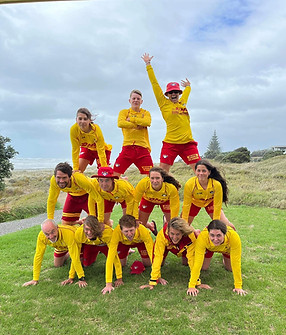
Lifeguarding Patrols
Surf lifeguard patrols are the fundamental activity of all surf lifesaving clubs. Patrols at Opotiki Surflifesaving Club include setting up the flagged area for safe swimming along with testing, setting up and monitoring the communications and rescue equipment. This includes the Inflatable Rescue Boat (IRB). Each patrol makes sure the First-Aid room is prepared for any emergency. Lifeguards constantly scan and patrol the beach to educate and prevent injury and/or harm to beachgoers.
All Surf Club Members who want to compete (other than Masters) are required to perform a minimum number of patrols throughout the season to qualify for competition. This makes sure that competing surf lifesavers keep their key lifesaving skills up to standard.
Clubs are also required to make sure that an adequate standard of patrol is maintained. This requires a minimum number of lifeguards with appropriate qualifications, including First Aid Levels 1 & 2 and IRB, to be in attendance during mandatory patrolling days and times. Club patrols are regularly audited by Surf Life Saving Eastern Region (SLSER) and it is the club’s responsibility to provide and resource its patrols to the highest standards possible.
Our patrolling members are proud to wear their surf lifeguard uniforms and undertake their patrolling duties. They present a professional and re-assuring presence to beachgoers and are responsible for a number of rescues and preventative actions at Waiotahe Beach each year.

Surf Lifeguard Award
The Surf Lifeguard Award (SLA) is the entry-level qualification for surf lifeguarding in New Zealand and can be attained at 14 years of age. The Surf Lifeguard training programme aims to develop a candidate's fundamental beach management, search & rescue and first aid skills to become a competent lifeguard on patrol.
The award is attained following a course of club instruction covering both physical and theoretical lifesaving skills. These skills are developed over a period of 6–10 weeks of instruction, depending on the level of skills that have been attained through the candidate's membership in the Junior Surf division or other similar activities.
The lifeguard exam involves assessment by Surf Life Saving NZ Examiners on theoretical knowledge, actual surf life saving skills and rescue/resuscitation skills.
Topics Covered:
-
Health, safety, welfare and risk management
-
Roles and responsibilities
-
Surf environment
-
Communications
-
Rescue equipment
-
Surf lifeguard skills
-
CPR
-
First Aid
Exam components:
-
400m pool swim under 9 minutes
-
Run-Swim-Run in the Surf
-
Tube Rescue in the pool and surf
-
First Aid and CPR
-
Communication
-
Signals
-
Radio Communication
-
Theory questions
-
Rescue tows and releases
Workbook:
-
To be completed during training
Heading 3
Heading 3
The SLA qualification is the minimum qualification required for both patrolling and competing members.
More information on the Surf Lifeguard Award can be found here
Leadership Skills Development
Surf lifeguards can attain a number of different qualifications and awards which are recognised by the community at large as demonstrating leadership skills.
Prospective employers look to these types of qualifications in addition to the usual academic achievement when interviewing potential employees.
There are also opportunities within clubs and the District and National surf lifesaving organisations for lifeguards to move into a professional surf lifesaving or surf sports career.
Surf Life Saving NZ therefore support and provide various leadership skills training opportunities annually. Details can be obtained from the SLSNZ website www.lifesaving.org.nz

Patrol Support
For those who would like to volunteer and be involved in patrolling but may not have the physical requirements to acquire their Lifeguard Award, the Patrol Supporter can complete the theory and First-Aid component of the Lifeguard Award. This allows the Patrol Supporter to patrol but they cannot take part in water-based activities such as rescues and preventative actions.
Exam components:
-
First Aid and CPR
-
Communication Signals
-
Radio Communication
-
Theory questions
Workbook:
-
To be completed during training
More information on the Patrol Support Award can be found here
Topics Covered:
-
Health, safety, welfare and risk management
-
Roles and responsibilities
-
Surf environment
-
Communications
-
CPR
-
First Aid

Lifeguard Pathways
Whether setting up patrol areas or rescuing in heavy surf, every Lifeguard knows the powerful motivation of saving or protecting a life. It is a motivation that marks Surf Life Saving as more than just 'something to do' at the weekend.
When you turn 14 you can sit your Surf Lifeguard Award and once you have your award there are a range of programmes and other awards you can participate in to develop your skills further. Click on an award below to access additional information, such as pre-requisites, length of course, and who to contact.










